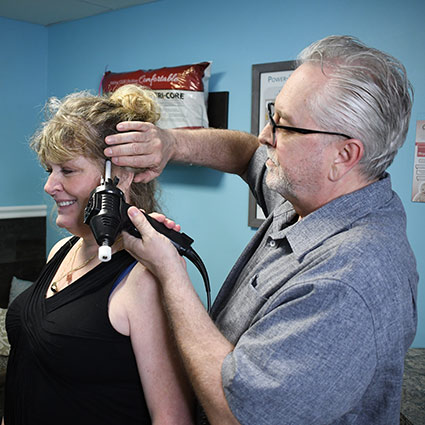Help for TMJ in Royal Oak
If you experience clicking, popping or pain in your jaw, you may have temporomandibular joint (TMJ) syndrome or temporomandibular joint dysfunction (TMD).
How a Jaw Should Function
What Are the Causes of TMJ Issues?
Causes of TMJ can vary widely. These include the following:
- Waking up with jaw pain but not knowing why it’s hurting
- Eating hard foods such as pizza crust or steak
- An injury such as a bump to the head
- Dental work that requires the mouth being open for an hour or more
If your jaw is not in a good position, it can drop down and cause issues with pain. When diagnosing TMJ, we’re not just looking at the jaw but also the cranial bones, the neck and the shoulders as they’re all connected.

How Chiropractic Can Help
With chiropractic, we want to make sure your jaw is in the proper position. We can address the temporal bone and the mandibular bone, and will adjust all the different cranial bones. We use a tool to gently adjust any areas of the skull and put them in the right position.
While heat, ice and pain relievers all can provide some relief to your TMJ pain, those things mask the symptoms. Chiropractors want to look at the root cause. We don’t want to give you a bigger bandage. For example, we want to determine why your jaw is tracking wrong or causing pain. We also can work hand in hand with your dentist for optimal results.
First Steps to Take
The first thing we recommend is seeing a dentist as a problem with a tooth might be affecting your jaw. Your dentist may recommend wearing a bite guard or an appliance at night, particularly if you grind your teeth. If you’re a teeth grinder, your jaw isn’t getting the break it needs. That’s why you’ll wake up with a sore jaw.
While the jaw is clenched: We would have you clench your jaw, so we adjust to prompt the muscles to relax. Then, we would ask you to open your jaw to make sure the tracking is in the right position. We want to ensure you can deviate your jaw from the right side to the left side, so all the muscles and ligaments are feeling good and not causing tension.
Through the roof of the mouth: While you open your mouth, we can adjust from the inside of the jaw too to make sure it’s in the right position.
If you are having an issue with your jaw-say your left side, and then tell us that your neck is always tight on the left side or your shoulder is always tight on the left side-that’s a connection point. We want to make sure we address your jaw but also want to adjust your neck and your shoulders.
If your sacrum (your tailbone) is off, it can directly put tension on your cranium. If you tuck your chin down, for example, you can feel how it pulls the whole body. You have to make sure your pelvis and your entire tailbone area are stable, which, in many cases, actually helps the jaw.
Book an Appointment
If you’ve been putting up with jaw pain, and have tried getting relief without any success, help is available. Contact our Royal Oak practice today to schedule an appointment!
CONTACT US

